A Critical Analysis of EU-ACP Development Cooperation: Brown (2000)
VerifiedAdded on 2023/05/30
|10
|2127
|270
Essay
AI Summary
This essay presents a critical analysis of William Brown's 2000 article, "Restructuring North-South Relations: ACP-EU Development Co-operation in a Liberal International Order." The analysis supports Brown's arguments concerning the Economic Partnership Agreements (EPAs) between the European Union (EU) and the African, Caribbean, and Pacific (ACP) countries. It explores the developmental, political, and economic assumptions underlying Brown's claims, emphasizing the historical context of North-South relations and the role of neo-liberalism. The essay highlights the reformulation of the ACP-EU Partnership Agreement to address trade and social disagreements from the Lome Convention, incorporating liberalism principles aligned with WTO policies. It further justifies the EPA's regionalist policies and special treatment for Least Developed Countries (LDCs) within the ACP, emphasizing the need for decolonization and sovereignty in economic development. The analysis concludes by discussing the potential implications of these trade agreements, including economic diversification, enhanced competitiveness, and indirect financial aid for ACP countries, ultimately supporting Brown's assertion that these agreements represent a necessary evolution in EU-ACP relations.
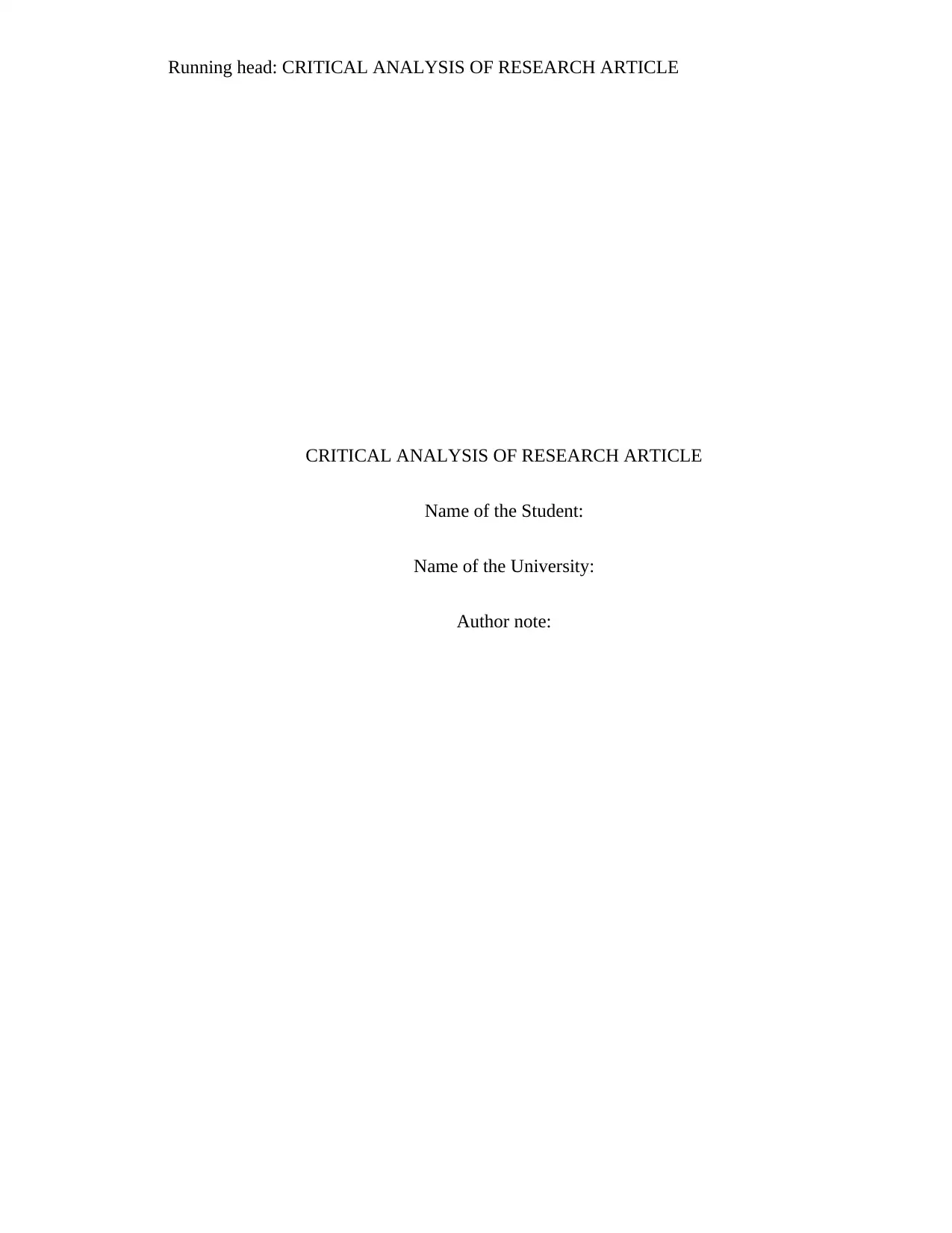
Running head: CRITICAL ANALYSIS OF RESEARCH ARTICLE
CRITICAL ANALYSIS OF RESEARCH ARTICLE
Name of the Student:
Name of the University:
Author note:
CRITICAL ANALYSIS OF RESEARCH ARTICLE
Name of the Student:
Name of the University:
Author note:
Paraphrase This Document
Need a fresh take? Get an instant paraphrase of this document with our AI Paraphraser
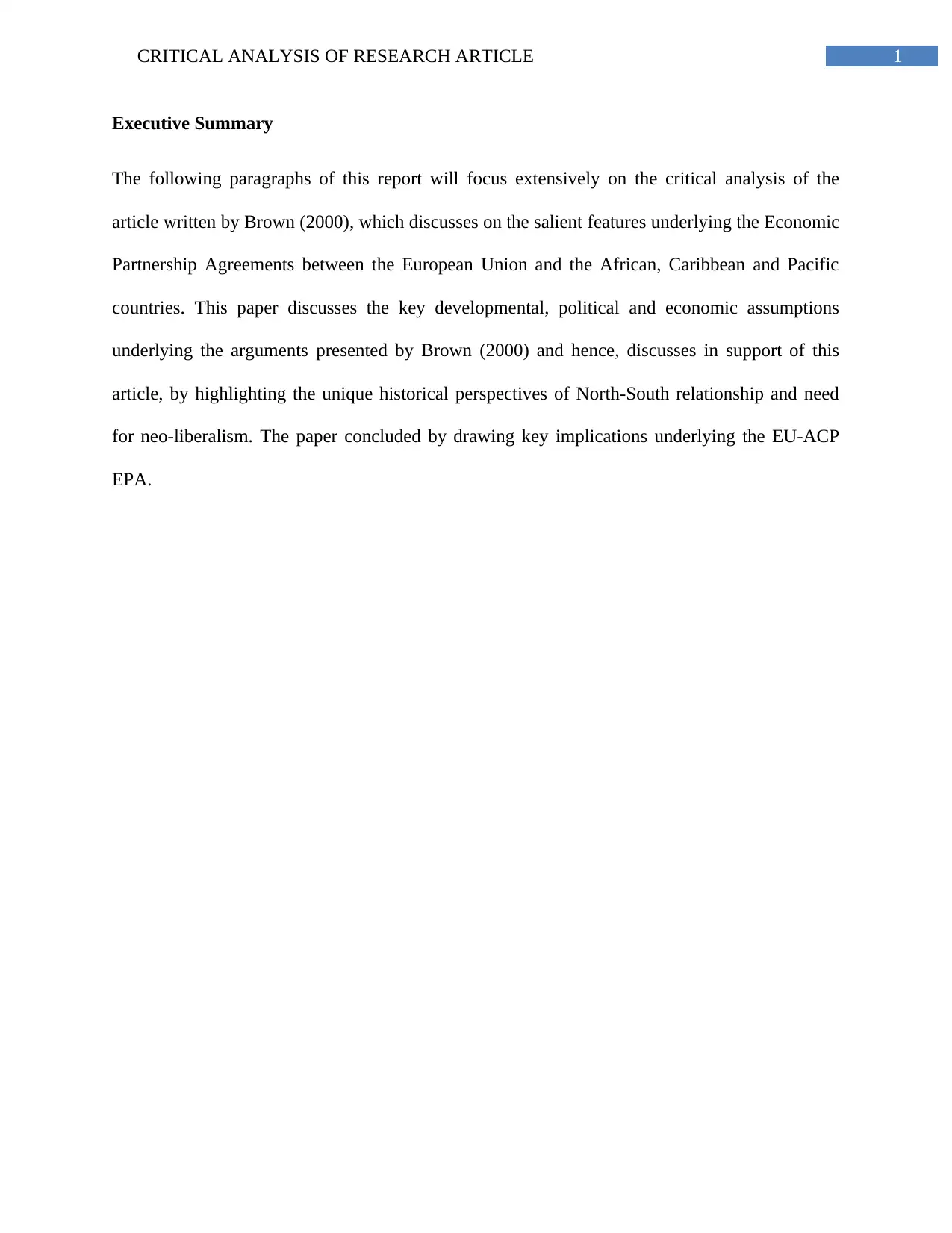
1CRITICAL ANALYSIS OF RESEARCH ARTICLE
Executive Summary
The following paragraphs of this report will focus extensively on the critical analysis of the
article written by Brown (2000), which discusses on the salient features underlying the Economic
Partnership Agreements between the European Union and the African, Caribbean and Pacific
countries. This paper discusses the key developmental, political and economic assumptions
underlying the arguments presented by Brown (2000) and hence, discusses in support of this
article, by highlighting the unique historical perspectives of North-South relationship and need
for neo-liberalism. The paper concluded by drawing key implications underlying the EU-ACP
EPA.
Executive Summary
The following paragraphs of this report will focus extensively on the critical analysis of the
article written by Brown (2000), which discusses on the salient features underlying the Economic
Partnership Agreements between the European Union and the African, Caribbean and Pacific
countries. This paper discusses the key developmental, political and economic assumptions
underlying the arguments presented by Brown (2000) and hence, discusses in support of this
article, by highlighting the unique historical perspectives of North-South relationship and need
for neo-liberalism. The paper concluded by drawing key implications underlying the EU-ACP
EPA.
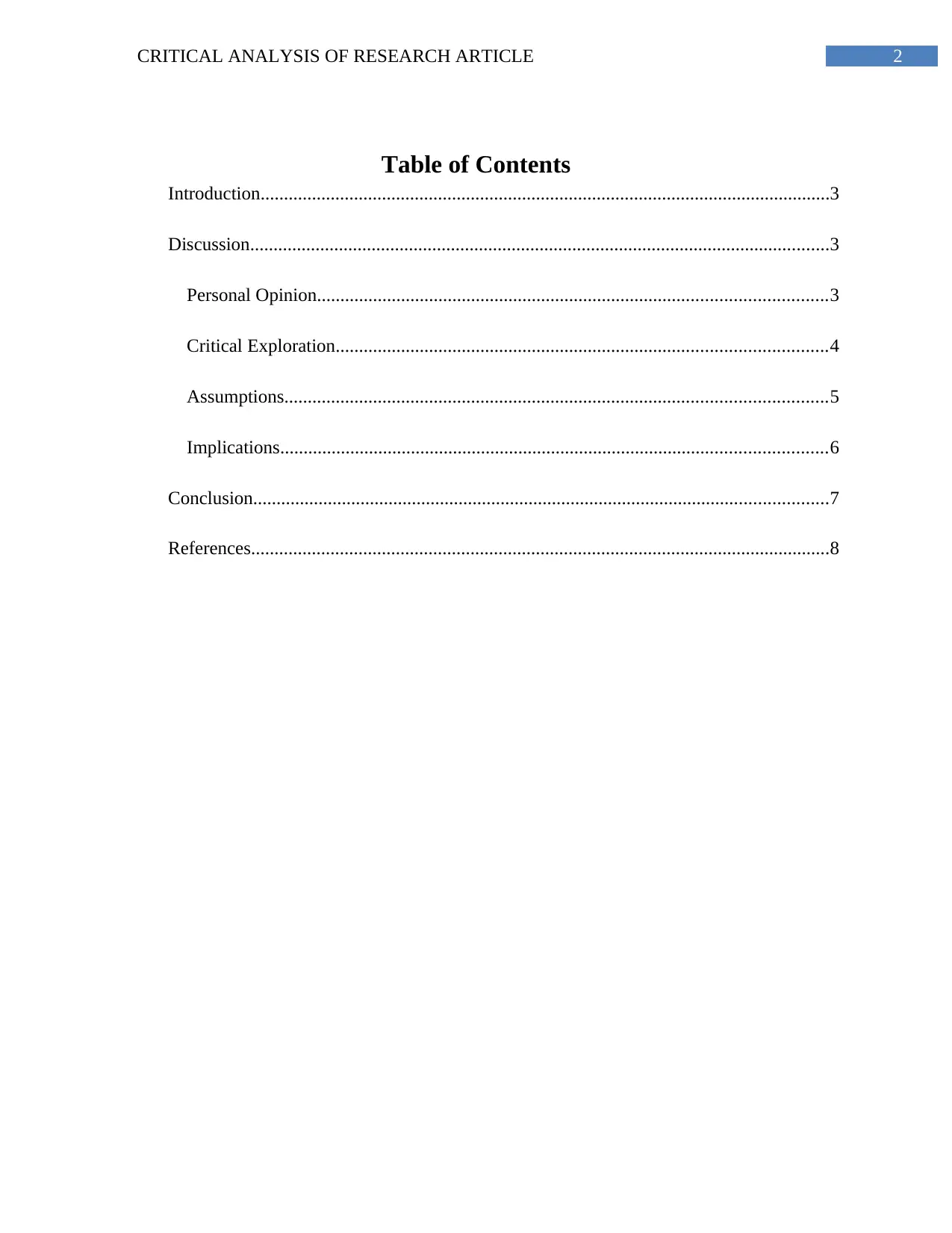
2CRITICAL ANALYSIS OF RESEARCH ARTICLE
Table of Contents
Introduction..........................................................................................................................3
Discussion............................................................................................................................3
Personal Opinion.............................................................................................................3
Critical Exploration.........................................................................................................4
Assumptions....................................................................................................................5
Implications.....................................................................................................................6
Conclusion...........................................................................................................................7
References............................................................................................................................8
Table of Contents
Introduction..........................................................................................................................3
Discussion............................................................................................................................3
Personal Opinion.............................................................................................................3
Critical Exploration.........................................................................................................4
Assumptions....................................................................................................................5
Implications.....................................................................................................................6
Conclusion...........................................................................................................................7
References............................................................................................................................8
⊘ This is a preview!⊘
Do you want full access?
Subscribe today to unlock all pages.

Trusted by 1+ million students worldwide
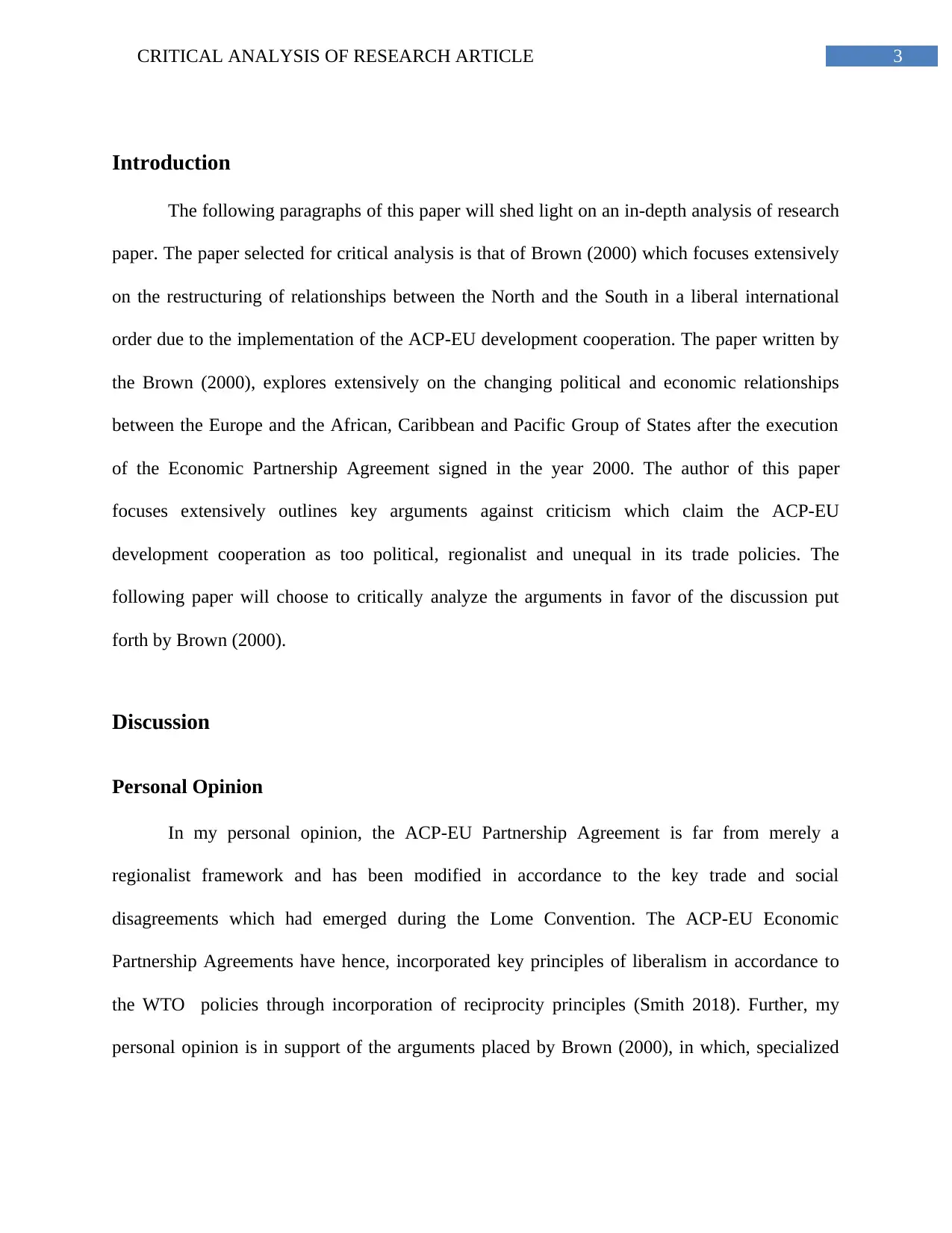
3CRITICAL ANALYSIS OF RESEARCH ARTICLE
Introduction
The following paragraphs of this paper will shed light on an in-depth analysis of research
paper. The paper selected for critical analysis is that of Brown (2000) which focuses extensively
on the restructuring of relationships between the North and the South in a liberal international
order due to the implementation of the ACP-EU development cooperation. The paper written by
the Brown (2000), explores extensively on the changing political and economic relationships
between the Europe and the African, Caribbean and Pacific Group of States after the execution
of the Economic Partnership Agreement signed in the year 2000. The author of this paper
focuses extensively outlines key arguments against criticism which claim the ACP-EU
development cooperation as too political, regionalist and unequal in its trade policies. The
following paper will choose to critically analyze the arguments in favor of the discussion put
forth by Brown (2000).
Discussion
Personal Opinion
In my personal opinion, the ACP-EU Partnership Agreement is far from merely a
regionalist framework and has been modified in accordance to the key trade and social
disagreements which had emerged during the Lome Convention. The ACP-EU Economic
Partnership Agreements have hence, incorporated key principles of liberalism in accordance to
the WTO policies through incorporation of reciprocity principles (Smith 2018). Further, my
personal opinion is in support of the arguments placed by Brown (2000), in which, specialized
Introduction
The following paragraphs of this paper will shed light on an in-depth analysis of research
paper. The paper selected for critical analysis is that of Brown (2000) which focuses extensively
on the restructuring of relationships between the North and the South in a liberal international
order due to the implementation of the ACP-EU development cooperation. The paper written by
the Brown (2000), explores extensively on the changing political and economic relationships
between the Europe and the African, Caribbean and Pacific Group of States after the execution
of the Economic Partnership Agreement signed in the year 2000. The author of this paper
focuses extensively outlines key arguments against criticism which claim the ACP-EU
development cooperation as too political, regionalist and unequal in its trade policies. The
following paper will choose to critically analyze the arguments in favor of the discussion put
forth by Brown (2000).
Discussion
Personal Opinion
In my personal opinion, the ACP-EU Partnership Agreement is far from merely a
regionalist framework and has been modified in accordance to the key trade and social
disagreements which had emerged during the Lome Convention. The ACP-EU Economic
Partnership Agreements have hence, incorporated key principles of liberalism in accordance to
the WTO policies through incorporation of reciprocity principles (Smith 2018). Further, my
personal opinion is in support of the arguments placed by Brown (2000), in which, specialized
Paraphrase This Document
Need a fresh take? Get an instant paraphrase of this document with our AI Paraphraser
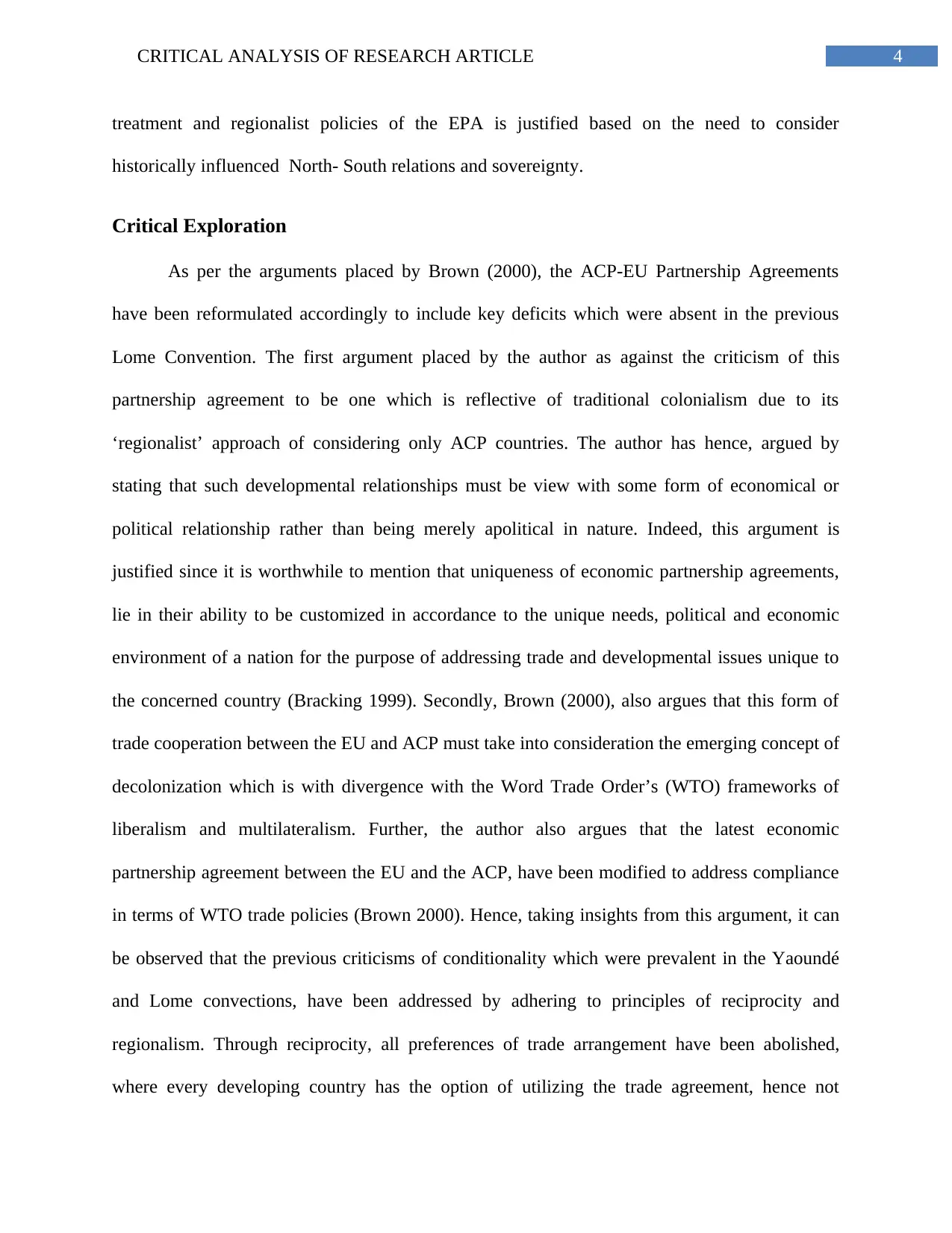
4CRITICAL ANALYSIS OF RESEARCH ARTICLE
treatment and regionalist policies of the EPA is justified based on the need to consider
historically influenced North- South relations and sovereignty.
Critical Exploration
As per the arguments placed by Brown (2000), the ACP-EU Partnership Agreements
have been reformulated accordingly to include key deficits which were absent in the previous
Lome Convention. The first argument placed by the author as against the criticism of this
partnership agreement to be one which is reflective of traditional colonialism due to its
‘regionalist’ approach of considering only ACP countries. The author has hence, argued by
stating that such developmental relationships must be view with some form of economical or
political relationship rather than being merely apolitical in nature. Indeed, this argument is
justified since it is worthwhile to mention that uniqueness of economic partnership agreements,
lie in their ability to be customized in accordance to the unique needs, political and economic
environment of a nation for the purpose of addressing trade and developmental issues unique to
the concerned country (Bracking 1999). Secondly, Brown (2000), also argues that this form of
trade cooperation between the EU and ACP must take into consideration the emerging concept of
decolonization which is with divergence with the Word Trade Order’s (WTO) frameworks of
liberalism and multilateralism. Further, the author also argues that the latest economic
partnership agreement between the EU and the ACP, have been modified to address compliance
in terms of WTO trade policies (Brown 2000). Hence, taking insights from this argument, it can
be observed that the previous criticisms of conditionality which were prevalent in the Yaoundé
and Lome convections, have been addressed by adhering to principles of reciprocity and
regionalism. Through reciprocity, all preferences of trade arrangement have been abolished,
where every developing country has the option of utilizing the trade agreement, hence not
treatment and regionalist policies of the EPA is justified based on the need to consider
historically influenced North- South relations and sovereignty.
Critical Exploration
As per the arguments placed by Brown (2000), the ACP-EU Partnership Agreements
have been reformulated accordingly to include key deficits which were absent in the previous
Lome Convention. The first argument placed by the author as against the criticism of this
partnership agreement to be one which is reflective of traditional colonialism due to its
‘regionalist’ approach of considering only ACP countries. The author has hence, argued by
stating that such developmental relationships must be view with some form of economical or
political relationship rather than being merely apolitical in nature. Indeed, this argument is
justified since it is worthwhile to mention that uniqueness of economic partnership agreements,
lie in their ability to be customized in accordance to the unique needs, political and economic
environment of a nation for the purpose of addressing trade and developmental issues unique to
the concerned country (Bracking 1999). Secondly, Brown (2000), also argues that this form of
trade cooperation between the EU and ACP must take into consideration the emerging concept of
decolonization which is with divergence with the Word Trade Order’s (WTO) frameworks of
liberalism and multilateralism. Further, the author also argues that the latest economic
partnership agreement between the EU and the ACP, have been modified to address compliance
in terms of WTO trade policies (Brown 2000). Hence, taking insights from this argument, it can
be observed that the previous criticisms of conditionality which were prevalent in the Yaoundé
and Lome convections, have been addressed by adhering to principles of reciprocity and
regionalism. Through reciprocity, all preferences of trade arrangement have been abolished,
where every developing country has the option of utilizing the trade agreement, hence not
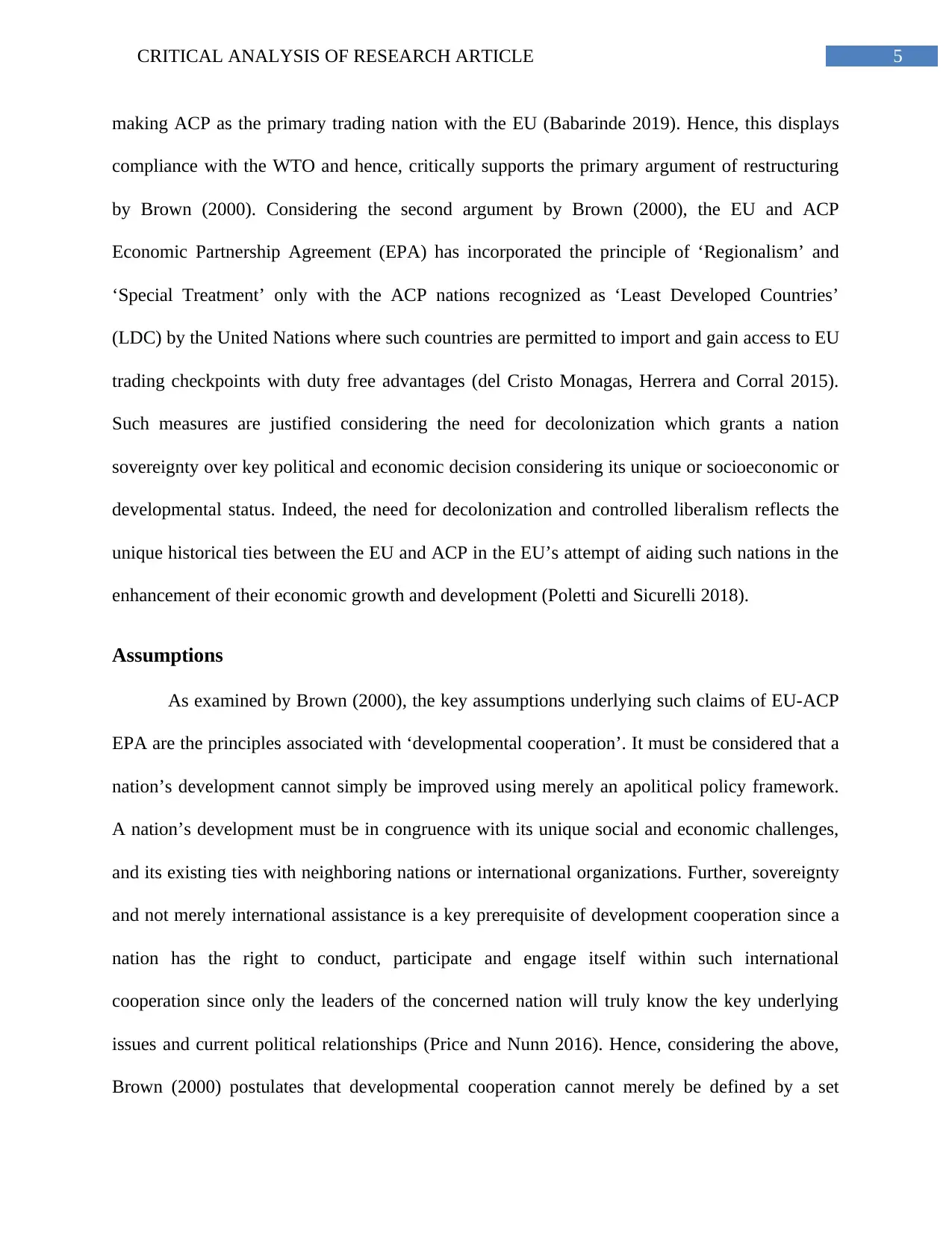
5CRITICAL ANALYSIS OF RESEARCH ARTICLE
making ACP as the primary trading nation with the EU (Babarinde 2019). Hence, this displays
compliance with the WTO and hence, critically supports the primary argument of restructuring
by Brown (2000). Considering the second argument by Brown (2000), the EU and ACP
Economic Partnership Agreement (EPA) has incorporated the principle of ‘Regionalism’ and
‘Special Treatment’ only with the ACP nations recognized as ‘Least Developed Countries’
(LDC) by the United Nations where such countries are permitted to import and gain access to EU
trading checkpoints with duty free advantages (del Cristo Monagas, Herrera and Corral 2015).
Such measures are justified considering the need for decolonization which grants a nation
sovereignty over key political and economic decision considering its unique or socioeconomic or
developmental status. Indeed, the need for decolonization and controlled liberalism reflects the
unique historical ties between the EU and ACP in the EU’s attempt of aiding such nations in the
enhancement of their economic growth and development (Poletti and Sicurelli 2018).
Assumptions
As examined by Brown (2000), the key assumptions underlying such claims of EU-ACP
EPA are the principles associated with ‘developmental cooperation’. It must be considered that a
nation’s development cannot simply be improved using merely an apolitical policy framework.
A nation’s development must be in congruence with its unique social and economic challenges,
and its existing ties with neighboring nations or international organizations. Further, sovereignty
and not merely international assistance is a key prerequisite of development cooperation since a
nation has the right to conduct, participate and engage itself within such international
cooperation since only the leaders of the concerned nation will truly know the key underlying
issues and current political relationships (Price and Nunn 2016). Hence, considering the above,
Brown (2000) postulates that developmental cooperation cannot merely be defined by a set
making ACP as the primary trading nation with the EU (Babarinde 2019). Hence, this displays
compliance with the WTO and hence, critically supports the primary argument of restructuring
by Brown (2000). Considering the second argument by Brown (2000), the EU and ACP
Economic Partnership Agreement (EPA) has incorporated the principle of ‘Regionalism’ and
‘Special Treatment’ only with the ACP nations recognized as ‘Least Developed Countries’
(LDC) by the United Nations where such countries are permitted to import and gain access to EU
trading checkpoints with duty free advantages (del Cristo Monagas, Herrera and Corral 2015).
Such measures are justified considering the need for decolonization which grants a nation
sovereignty over key political and economic decision considering its unique or socioeconomic or
developmental status. Indeed, the need for decolonization and controlled liberalism reflects the
unique historical ties between the EU and ACP in the EU’s attempt of aiding such nations in the
enhancement of their economic growth and development (Poletti and Sicurelli 2018).
Assumptions
As examined by Brown (2000), the key assumptions underlying such claims of EU-ACP
EPA are the principles associated with ‘developmental cooperation’. It must be considered that a
nation’s development cannot simply be improved using merely an apolitical policy framework.
A nation’s development must be in congruence with its unique social and economic challenges,
and its existing ties with neighboring nations or international organizations. Further, sovereignty
and not merely international assistance is a key prerequisite of development cooperation since a
nation has the right to conduct, participate and engage itself within such international
cooperation since only the leaders of the concerned nation will truly know the key underlying
issues and current political relationships (Price and Nunn 2016). Hence, considering the above,
Brown (2000) postulates that developmental cooperation cannot merely be defined by a set
⊘ This is a preview!⊘
Do you want full access?
Subscribe today to unlock all pages.

Trusted by 1+ million students worldwide
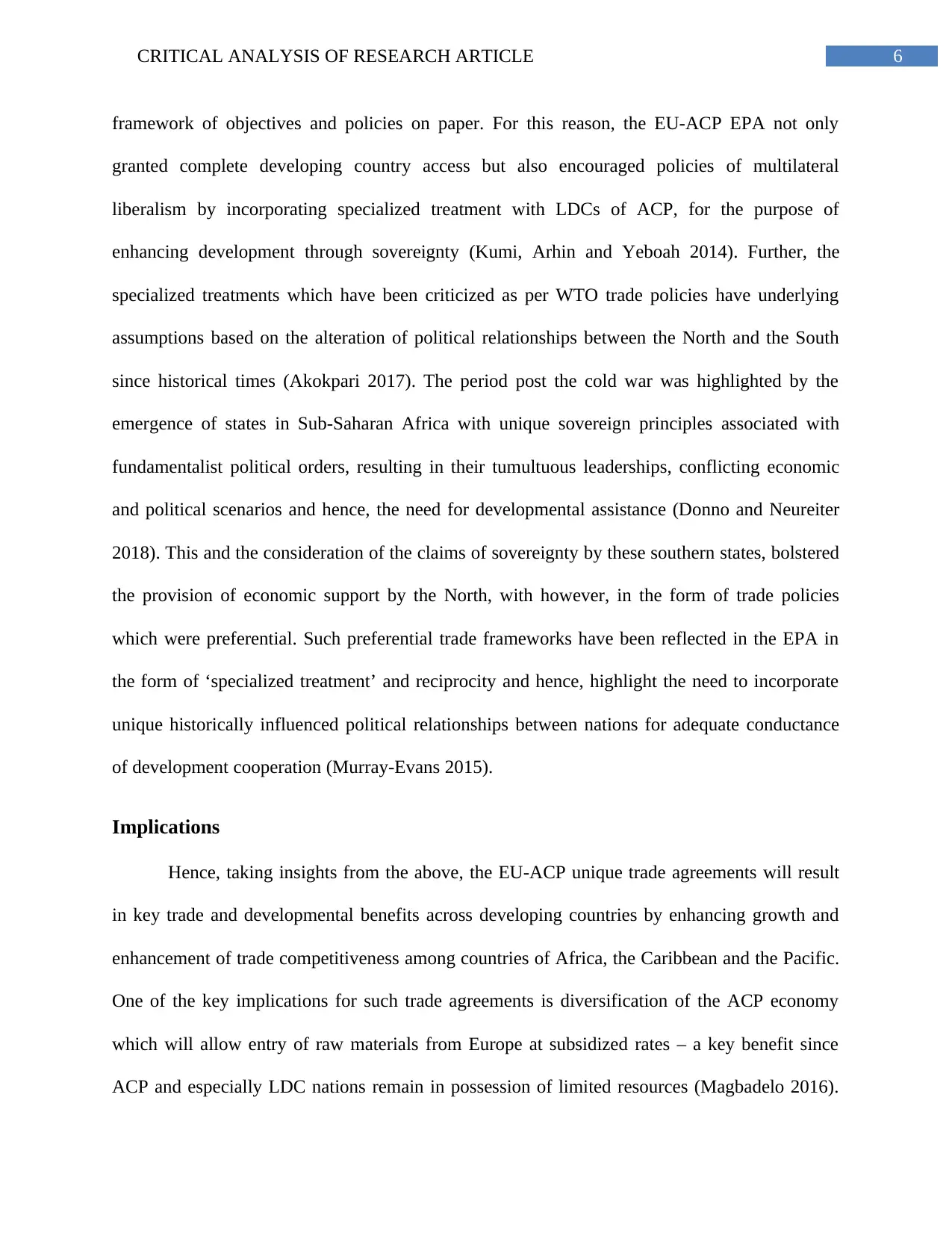
6CRITICAL ANALYSIS OF RESEARCH ARTICLE
framework of objectives and policies on paper. For this reason, the EU-ACP EPA not only
granted complete developing country access but also encouraged policies of multilateral
liberalism by incorporating specialized treatment with LDCs of ACP, for the purpose of
enhancing development through sovereignty (Kumi, Arhin and Yeboah 2014). Further, the
specialized treatments which have been criticized as per WTO trade policies have underlying
assumptions based on the alteration of political relationships between the North and the South
since historical times (Akokpari 2017). The period post the cold war was highlighted by the
emergence of states in Sub-Saharan Africa with unique sovereign principles associated with
fundamentalist political orders, resulting in their tumultuous leaderships, conflicting economic
and political scenarios and hence, the need for developmental assistance (Donno and Neureiter
2018). This and the consideration of the claims of sovereignty by these southern states, bolstered
the provision of economic support by the North, with however, in the form of trade policies
which were preferential. Such preferential trade frameworks have been reflected in the EPA in
the form of ‘specialized treatment’ and reciprocity and hence, highlight the need to incorporate
unique historically influenced political relationships between nations for adequate conductance
of development cooperation (Murray-Evans 2015).
Implications
Hence, taking insights from the above, the EU-ACP unique trade agreements will result
in key trade and developmental benefits across developing countries by enhancing growth and
enhancement of trade competitiveness among countries of Africa, the Caribbean and the Pacific.
One of the key implications for such trade agreements is diversification of the ACP economy
which will allow entry of raw materials from Europe at subsidized rates – a key benefit since
ACP and especially LDC nations remain in possession of limited resources (Magbadelo 2016).
framework of objectives and policies on paper. For this reason, the EU-ACP EPA not only
granted complete developing country access but also encouraged policies of multilateral
liberalism by incorporating specialized treatment with LDCs of ACP, for the purpose of
enhancing development through sovereignty (Kumi, Arhin and Yeboah 2014). Further, the
specialized treatments which have been criticized as per WTO trade policies have underlying
assumptions based on the alteration of political relationships between the North and the South
since historical times (Akokpari 2017). The period post the cold war was highlighted by the
emergence of states in Sub-Saharan Africa with unique sovereign principles associated with
fundamentalist political orders, resulting in their tumultuous leaderships, conflicting economic
and political scenarios and hence, the need for developmental assistance (Donno and Neureiter
2018). This and the consideration of the claims of sovereignty by these southern states, bolstered
the provision of economic support by the North, with however, in the form of trade policies
which were preferential. Such preferential trade frameworks have been reflected in the EPA in
the form of ‘specialized treatment’ and reciprocity and hence, highlight the need to incorporate
unique historically influenced political relationships between nations for adequate conductance
of development cooperation (Murray-Evans 2015).
Implications
Hence, taking insights from the above, the EU-ACP unique trade agreements will result
in key trade and developmental benefits across developing countries by enhancing growth and
enhancement of trade competitiveness among countries of Africa, the Caribbean and the Pacific.
One of the key implications for such trade agreements is diversification of the ACP economy
which will allow entry of raw materials from Europe at subsidized rates – a key benefit since
ACP and especially LDC nations remain in possession of limited resources (Magbadelo 2016).
Paraphrase This Document
Need a fresh take? Get an instant paraphrase of this document with our AI Paraphraser
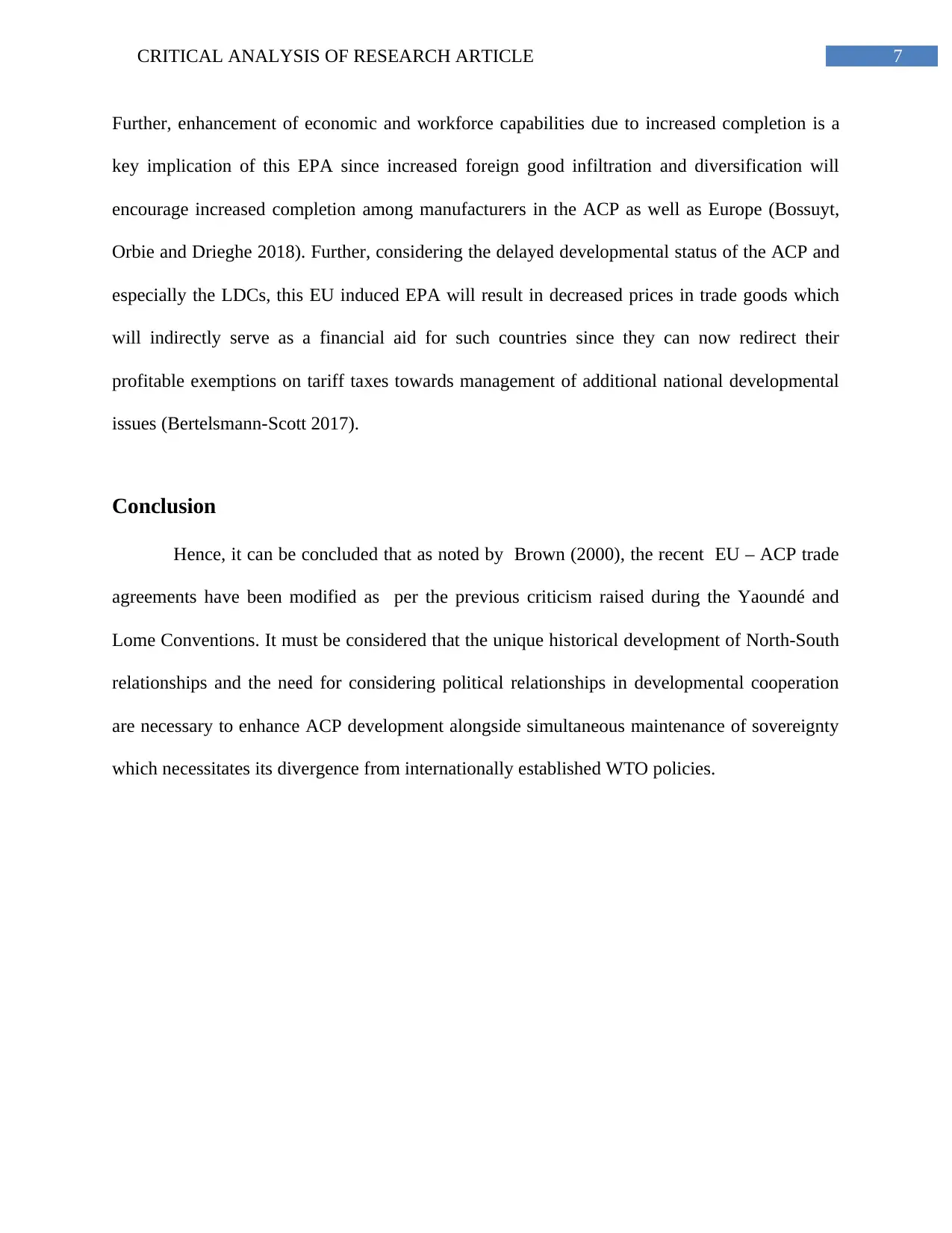
7CRITICAL ANALYSIS OF RESEARCH ARTICLE
Further, enhancement of economic and workforce capabilities due to increased completion is a
key implication of this EPA since increased foreign good infiltration and diversification will
encourage increased completion among manufacturers in the ACP as well as Europe (Bossuyt,
Orbie and Drieghe 2018). Further, considering the delayed developmental status of the ACP and
especially the LDCs, this EU induced EPA will result in decreased prices in trade goods which
will indirectly serve as a financial aid for such countries since they can now redirect their
profitable exemptions on tariff taxes towards management of additional national developmental
issues (Bertelsmann-Scott 2017).
Conclusion
Hence, it can be concluded that as noted by Brown (2000), the recent EU – ACP trade
agreements have been modified as per the previous criticism raised during the Yaoundé and
Lome Conventions. It must be considered that the unique historical development of North-South
relationships and the need for considering political relationships in developmental cooperation
are necessary to enhance ACP development alongside simultaneous maintenance of sovereignty
which necessitates its divergence from internationally established WTO policies.
Further, enhancement of economic and workforce capabilities due to increased completion is a
key implication of this EPA since increased foreign good infiltration and diversification will
encourage increased completion among manufacturers in the ACP as well as Europe (Bossuyt,
Orbie and Drieghe 2018). Further, considering the delayed developmental status of the ACP and
especially the LDCs, this EU induced EPA will result in decreased prices in trade goods which
will indirectly serve as a financial aid for such countries since they can now redirect their
profitable exemptions on tariff taxes towards management of additional national developmental
issues (Bertelsmann-Scott 2017).
Conclusion
Hence, it can be concluded that as noted by Brown (2000), the recent EU – ACP trade
agreements have been modified as per the previous criticism raised during the Yaoundé and
Lome Conventions. It must be considered that the unique historical development of North-South
relationships and the need for considering political relationships in developmental cooperation
are necessary to enhance ACP development alongside simultaneous maintenance of sovereignty
which necessitates its divergence from internationally established WTO policies.
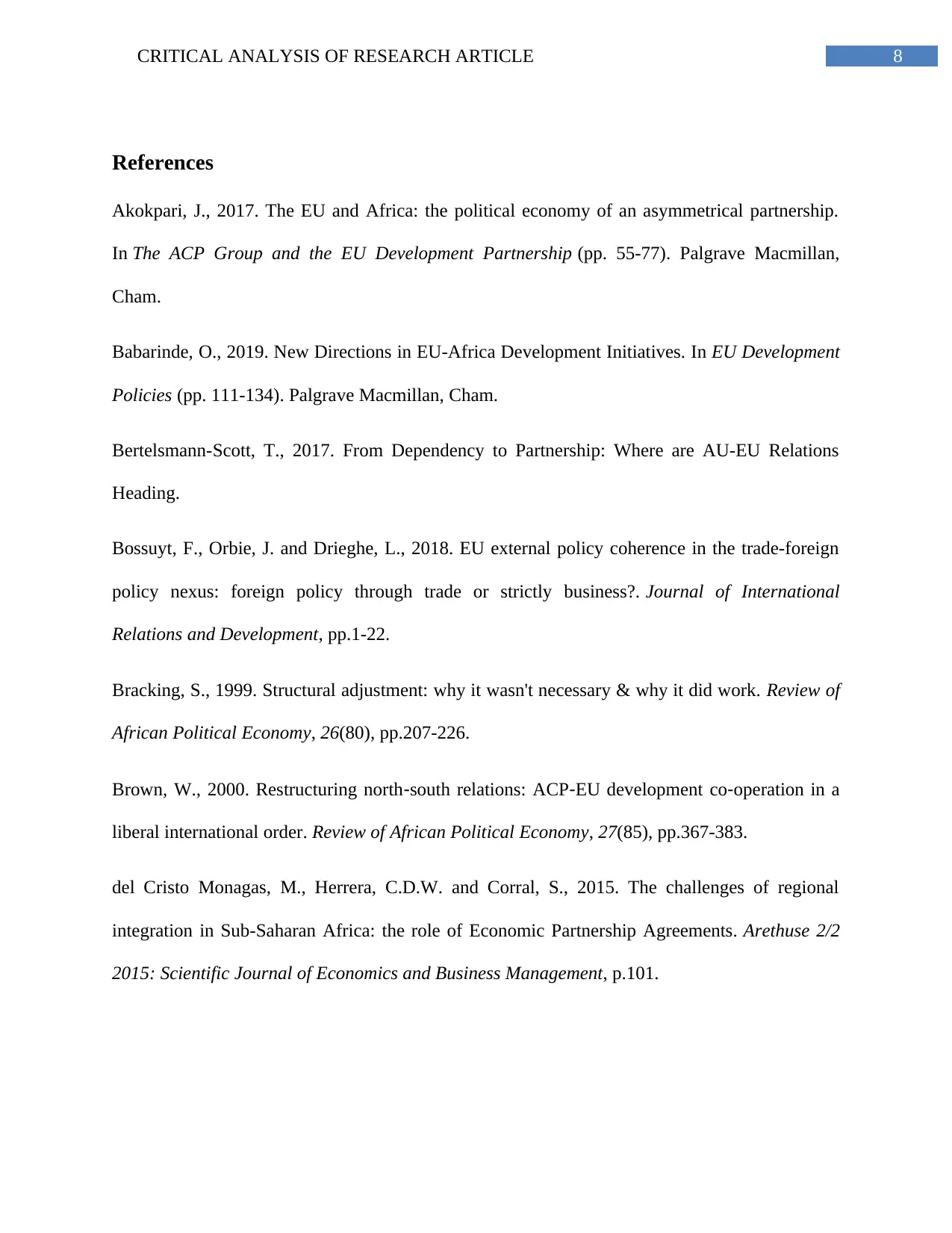
8CRITICAL ANALYSIS OF RESEARCH ARTICLE
References
Akokpari, J., 2017. The EU and Africa: the political economy of an asymmetrical partnership.
In The ACP Group and the EU Development Partnership (pp. 55-77). Palgrave Macmillan,
Cham.
Babarinde, O., 2019. New Directions in EU-Africa Development Initiatives. In EU Development
Policies (pp. 111-134). Palgrave Macmillan, Cham.
Bertelsmann-Scott, T., 2017. From Dependency to Partnership: Where are AU-EU Relations
Heading.
Bossuyt, F., Orbie, J. and Drieghe, L., 2018. EU external policy coherence in the trade-foreign
policy nexus: foreign policy through trade or strictly business?. Journal of International
Relations and Development, pp.1-22.
Bracking, S., 1999. Structural adjustment: why it wasn't necessary & why it did work. Review of
African Political Economy, 26(80), pp.207-226.
Brown, W., 2000. Restructuring north‐south relations: ACP‐EU development co‐operation in a
liberal international order. Review of African Political Economy, 27(85), pp.367-383.
del Cristo Monagas, M., Herrera, C.D.W. and Corral, S., 2015. The challenges of regional
integration in Sub-Saharan Africa: the role of Economic Partnership Agreements. Arethuse 2/2
2015: Scientific Journal of Economics and Business Management, p.101.
References
Akokpari, J., 2017. The EU and Africa: the political economy of an asymmetrical partnership.
In The ACP Group and the EU Development Partnership (pp. 55-77). Palgrave Macmillan,
Cham.
Babarinde, O., 2019. New Directions in EU-Africa Development Initiatives. In EU Development
Policies (pp. 111-134). Palgrave Macmillan, Cham.
Bertelsmann-Scott, T., 2017. From Dependency to Partnership: Where are AU-EU Relations
Heading.
Bossuyt, F., Orbie, J. and Drieghe, L., 2018. EU external policy coherence in the trade-foreign
policy nexus: foreign policy through trade or strictly business?. Journal of International
Relations and Development, pp.1-22.
Bracking, S., 1999. Structural adjustment: why it wasn't necessary & why it did work. Review of
African Political Economy, 26(80), pp.207-226.
Brown, W., 2000. Restructuring north‐south relations: ACP‐EU development co‐operation in a
liberal international order. Review of African Political Economy, 27(85), pp.367-383.
del Cristo Monagas, M., Herrera, C.D.W. and Corral, S., 2015. The challenges of regional
integration in Sub-Saharan Africa: the role of Economic Partnership Agreements. Arethuse 2/2
2015: Scientific Journal of Economics and Business Management, p.101.
⊘ This is a preview!⊘
Do you want full access?
Subscribe today to unlock all pages.

Trusted by 1+ million students worldwide
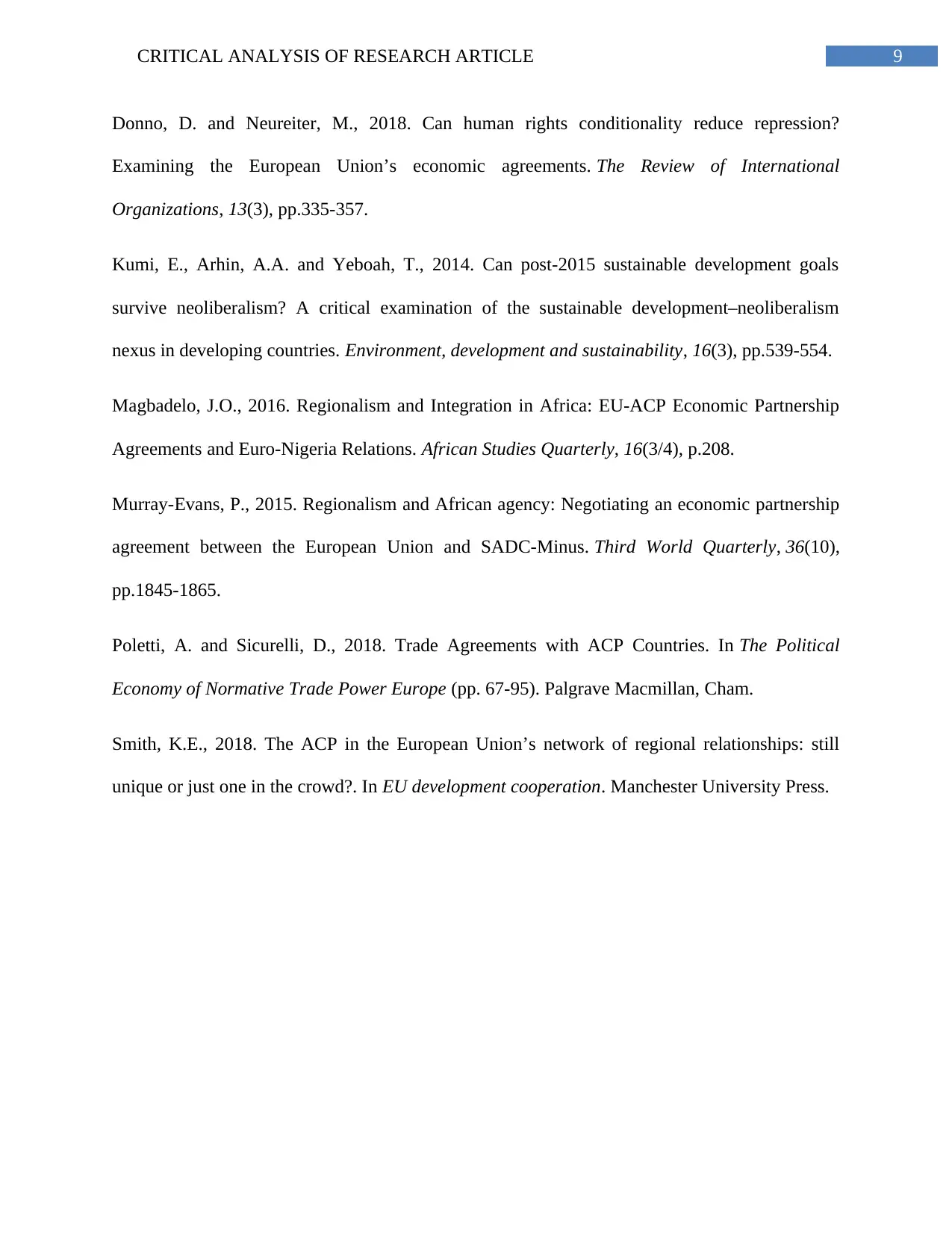
9CRITICAL ANALYSIS OF RESEARCH ARTICLE
Donno, D. and Neureiter, M., 2018. Can human rights conditionality reduce repression?
Examining the European Union’s economic agreements. The Review of International
Organizations, 13(3), pp.335-357.
Kumi, E., Arhin, A.A. and Yeboah, T., 2014. Can post-2015 sustainable development goals
survive neoliberalism? A critical examination of the sustainable development–neoliberalism
nexus in developing countries. Environment, development and sustainability, 16(3), pp.539-554.
Magbadelo, J.O., 2016. Regionalism and Integration in Africa: EU-ACP Economic Partnership
Agreements and Euro-Nigeria Relations. African Studies Quarterly, 16(3/4), p.208.
Murray-Evans, P., 2015. Regionalism and African agency: Negotiating an economic partnership
agreement between the European Union and SADC-Minus. Third World Quarterly, 36(10),
pp.1845-1865.
Poletti, A. and Sicurelli, D., 2018. Trade Agreements with ACP Countries. In The Political
Economy of Normative Trade Power Europe (pp. 67-95). Palgrave Macmillan, Cham.
Smith, K.E., 2018. The ACP in the European Union’s network of regional relationships: still
unique or just one in the crowd?. In EU development cooperation. Manchester University Press.
Donno, D. and Neureiter, M., 2018. Can human rights conditionality reduce repression?
Examining the European Union’s economic agreements. The Review of International
Organizations, 13(3), pp.335-357.
Kumi, E., Arhin, A.A. and Yeboah, T., 2014. Can post-2015 sustainable development goals
survive neoliberalism? A critical examination of the sustainable development–neoliberalism
nexus in developing countries. Environment, development and sustainability, 16(3), pp.539-554.
Magbadelo, J.O., 2016. Regionalism and Integration in Africa: EU-ACP Economic Partnership
Agreements and Euro-Nigeria Relations. African Studies Quarterly, 16(3/4), p.208.
Murray-Evans, P., 2015. Regionalism and African agency: Negotiating an economic partnership
agreement between the European Union and SADC-Minus. Third World Quarterly, 36(10),
pp.1845-1865.
Poletti, A. and Sicurelli, D., 2018. Trade Agreements with ACP Countries. In The Political
Economy of Normative Trade Power Europe (pp. 67-95). Palgrave Macmillan, Cham.
Smith, K.E., 2018. The ACP in the European Union’s network of regional relationships: still
unique or just one in the crowd?. In EU development cooperation. Manchester University Press.
1 out of 10
Your All-in-One AI-Powered Toolkit for Academic Success.
+13062052269
info@desklib.com
Available 24*7 on WhatsApp / Email
![[object Object]](/_next/static/media/star-bottom.7253800d.svg)
Unlock your academic potential
Copyright © 2020–2025 A2Z Services. All Rights Reserved. Developed and managed by ZUCOL.


